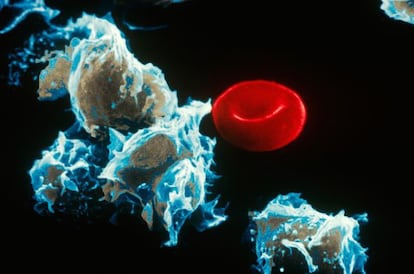Spanish research team publishes blood cancer breakthrough
University of Oviedo scientists identify protein imbalance that leads to leukemia

In the same way that there’s no murder investigation without a body, scientists have for decades believed that there can be no cancer without a tumor. But a team of Spanish researchers has discovered cancers that do not produce genetic mutation, publishing their findings in the last edition of the journal Nature Medicine.
The team’s research focused on a key biological process: the stability of proteins. Proteins are produced by our genes to regulate most of the bodily processes that keep us alive. Within our organism is sophisticated system that produces those we need, destroys those that are no longer useful, and cleans those that are damaged or that can create problems. As we get older, the system begins to break down and the balance between good proteins and bad proteins is upset.
The team has identified a protein that plays a key role in the appearance of a large number of blood tumors
“This imbalance is one of the clearest indicators of old age,” says Carlos López Otín of the University of Oviedo. He and his team have been researching the possible link between this process and cancer for the last decade.
Now the team has identified a protein that plays a key role in the appearance of a large number of blood tumors known as mieloproliferative syndromes. These are relatively common diseases in old people, with some five new cases each year in Spain per 100,000 people. The lack of the protein in question, AIRAPL, destabilizes the system that regulates cell growth. Without this protein, defective blood cells begin to appear, leading to a blood tumor.
There is such a thing as a tumor without a mutation, and they appear due to problems with protein stability”
The mechanism has been shown in mice, and the team has established that the same process takes place in the blood of some 100 people with these kinds of tumors. The research shows how the lack of this protein makes the growth factor receptor IGF-1 extremely active, unleashing the growth of tumor cells. IGF-1 is well known to researchers of the ageing process, and low levels of it are associated with greater longevity both in humans and other animals. López-Otín’s team have also shown that it is possible to revert tumors in mice using IGF-1 inhibitors, a type of pharmaceutical already approved for the treatment of other types of cancer.
“We have spent thousands of hours over the last six years studying which mutations cause cancer, and we have found that people with leukemia have more than 2,000 mutations,” says López Otín. “We can now see for the first time that there is such a thing as a tumor without a mutation, and that they appear due to problems with protein stability,” he says.
This process would seem to account for many types of blood cancer, adds López-Otín, and may also be present in solid tumors, such as those resulting from liver cancer. “We will have to continue researching into this new treatment to assess which patients could benefit,” he concludes.
Tu suscripción se está usando en otro dispositivo
¿Quieres añadir otro usuario a tu suscripción?
Si continúas leyendo en este dispositivo, no se podrá leer en el otro.
FlechaTu suscripción se está usando en otro dispositivo y solo puedes acceder a EL PAÍS desde un dispositivo a la vez.
Si quieres compartir tu cuenta, cambia tu suscripción a la modalidad Premium, así podrás añadir otro usuario. Cada uno accederá con su propia cuenta de email, lo que os permitirá personalizar vuestra experiencia en EL PAÍS.
¿Tienes una suscripción de empresa? Accede aquí para contratar más cuentas.
En el caso de no saber quién está usando tu cuenta, te recomendamos cambiar tu contraseña aquí.
Si decides continuar compartiendo tu cuenta, este mensaje se mostrará en tu dispositivo y en el de la otra persona que está usando tu cuenta de forma indefinida, afectando a tu experiencia de lectura. Puedes consultar aquí los términos y condiciones de la suscripción digital.









































